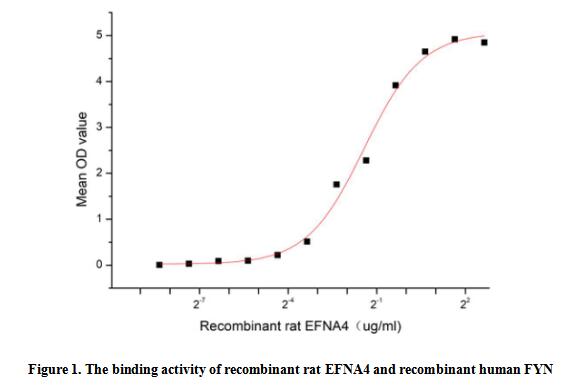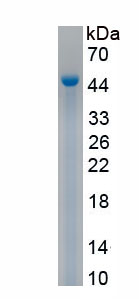Active Ephrin A4 (EFNA4)
EFL4; EPLG4; LERK4; EPH-related receptor tyrosine kinase ligand 4
- Product No.APE110Ra02
- Organism SpeciesRattus norvegicus (Rat) Same name, Different species.
- Buffer FormulationPBS, pH7.4, containing 0.01% SKL, 5% Trehalose.
- Traits Freeze-dried powder
- Purity> 90%
- Isoelectric Point6.5
- ApplicationsCell culture; Activity Assays.
- DownloadInstruction Manual
- UOM 10µg50µg 200µg 1mg 5mg
- FOB
US$ 270
US$ 676
US$ 1352
US$ 4056
US$ 10140
For more details, please contact local distributors!
ACTIVITY TEST

Ephrin-A4, also known as EFNA4 and EFL-4, is a member of the ligand of the EPH family. It is mainly expressed in the spleen, lymph nodes, ovary, small intestine and colon of adults, as well as in the heart, lungs, liver, and kidneys of the fetus. It is involved in the development of neurons, blood vessels, and epithelium by regulating cell migration, rejection, and adhesion. Ephrin-A4 has been shown to bind FYN,EphA2, EphA3, EphA4, EphA5, EphA6, EphA7, and EphB1. Thus a functional binding ELISA assay was conducted to detect the interaction of recombinant rat EFNA4 and recombinant human FYN. Briefly, EFNA4 was diluted serially in PBS with 0.01% BSA (pH 7.4). Duplicate samples of 100 μl were then transferred to FYN-coated microtiter wells and incubated for 1h at 37℃. Wells were washed with PBST and incubated for 1h with anti-EFNA4 pAb, then aspirated and washed 3 times. After incubation with HRP labelled secondary antibody for 1h at 37℃, wells were aspirated and washed 5 times. With the addition of substrate solution, wells were incubated 15-25 minutes at 37℃. Finally, add 50 µL stop solution to the wells and read at 450/630 nm immediately. The binding activity of recombinant rat EFNA4 and recombinant human FYN was shown in Figure 1, the EC50 for this effect is 0.37 ug/mL.
USAGE
Reconstitute in 10mM PBS (pH7.4) to a concentration of 0.1-1.0 mg/mL. Do not vortex.
STORAGE
Avoid repeated freeze/thaw cycles. Store at 2-8°C for one month. Aliquot and store at -80°C for 12 months.
STABILITY
The thermal stability is described by the loss rate. The loss rate was determined by accelerated thermal degradation test, that is, incubate the protein at 37°C for 48h, and no obvious degradation and precipitation were observed. The loss rate is less than 5% within the expiration date under appropriate storage condition.
GIVEAWAYS
INCREMENT SERVICES
-
 BCA Protein Quantification Kit
BCA Protein Quantification Kit
-
 Molecular Mass Marker for Protein
Molecular Mass Marker for Protein
-
 Monoclonal Antibody Customized Service
Monoclonal Antibody Customized Service
-
 Polyclonal Antibody Customized Service
Polyclonal Antibody Customized Service
-
 Protein Activity Test Experiment Service
Protein Activity Test Experiment Service
-
 Electrophoretic Mobility Shift Assay (EMSA) Experiment Service
Electrophoretic Mobility Shift Assay (EMSA) Experiment Service
-
 Buffer
Buffer
-
 Lentivirus Packaging Experiment Service
Lentivirus Packaging Experiment Service
-
 Adenovirus Packaging Experiment Service
Adenovirus Packaging Experiment Service
-
 Real Time PCR Experimental Service
Real Time PCR Experimental Service
-
 Spike RBD Protein (S-RBD)
Spike RBD Protein (S-RBD)
-
 Protein G
Protein G
-
 Protein A
Protein A
| Catalog No. | Related products for research use of Rattus norvegicus (Rat) Organism species | Applications (RESEARCH USE ONLY!) |
| RPE110Ra01 | Recombinant Ephrin A4 (EFNA4) | Positive Control; Immunogen; SDS-PAGE; WB. |
| RPE110Ra02 | Recombinant Ephrin A4 (EFNA4) | Positive Control; Immunogen; SDS-PAGE; WB. |
| APE110Ra02 | Active Ephrin A4 (EFNA4) | Cell culture; Activity Assays. |
| PAE110Ra01 | Polyclonal Antibody to Ephrin A4 (EFNA4) | WB; IHC; ICC; IP. |
| PAE110Ra02 | Polyclonal Antibody to Ephrin A4 (EFNA4) | WB; IHC; ICC; IP. |







